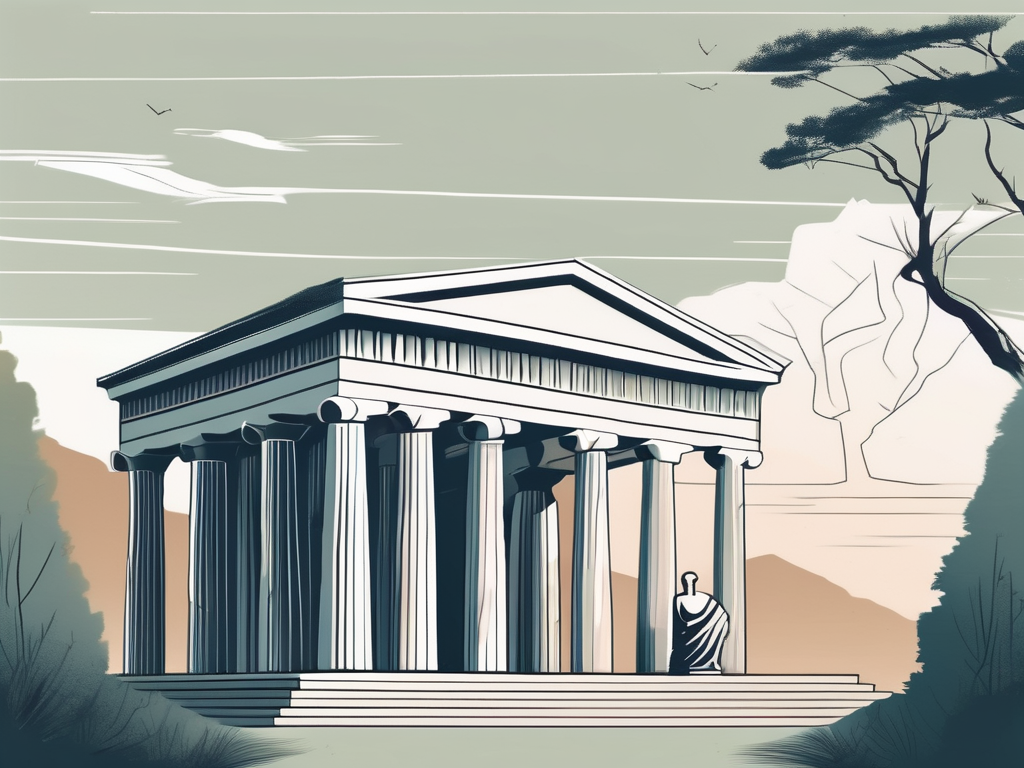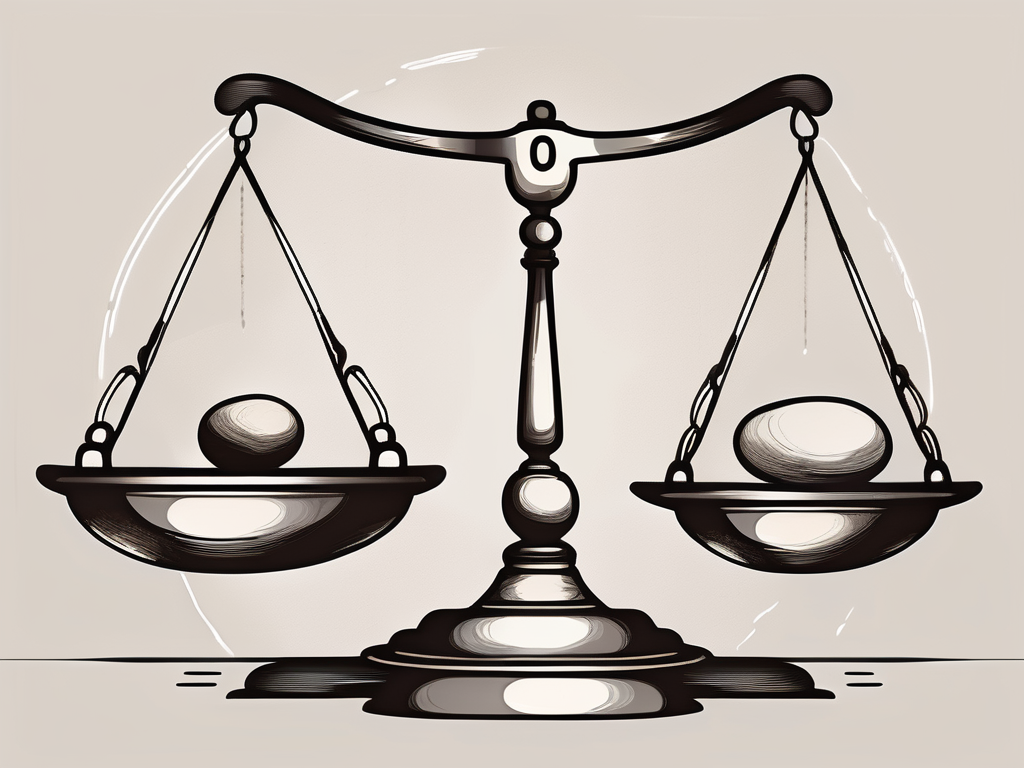Stoicism is a philosophy that has intrigued many throughout the ages. It offers wisdom on how to live a good life and find happiness, but where does it stand when it comes to matters of religion? Is Stoicism itself a religious belief system? In this article, we will dive deep into the world of Stoicism, explore its origins and key principles, and examine its relationship with religion. We’ll also compare Stoicism to major religions and analyze arguments both for and against Stoicism being considered a religion. Finally, we’ll explore the impact of Stoicism on modern spirituality. So, let’s embark on this philosophical journey and find out if Stoics are truly religious!
Understanding the Philosophy of Stoicism
Before we delve into the nuances of Stoicism, let’s first understand what this philosophy is all about. Stoicism originated in ancient Greece, rising to prominence in the Hellenistic period. Developed by philosophers such as Zeno of Citium, Cleanthes, and Epictetus, Stoicism offers a practical guide for leading a virtuous and fulfilling life. It emphasizes the cultivation of self-control, inner strength, and the pursuit of wisdom.
The Origins of Stoicism
The roots of Stoicism can be traced back to the teachings of ancient Greek philosophers. The original Stoics believed in living in harmony with nature, acknowledging that there are certain things beyond our control. Instead of longing for what is outside our reach, Stoics encouraged individuals to focus on cultivating inner virtue and resilience.
One of the key figures in the development of Stoicism was Zeno of Citium. Zeno was a philosopher who lived in Athens during the 3rd century BCE. He was influenced by the teachings of Socrates and the Cynics, but he also drew inspiration from the works of Heraclitus. Zeno believed that the key to a good life lies in living in accordance with nature and reason.
Cleanthes, another prominent Stoic philosopher, succeeded Zeno as the head of the Stoic school. He further developed the teachings of Zeno and emphasized the importance of living a virtuous life. Cleanthes believed that virtue is the only true good and that external possessions and circumstances are indifferent.
Epictetus, a former slave turned philosopher, is often regarded as one of the greatest Stoic thinkers. His teachings focused on the importance of accepting the things we cannot change and maintaining our integrity and moral character in the face of adversity. Epictetus believed that true freedom lies in our ability to control our own thoughts and actions, regardless of external circumstances.
Key Principles of Stoicism
Stoicism is built upon a foundation of key principles that guide its followers in their quest for a good life. At its core, Stoicism teaches that virtue is the only real good and that everything else is indifferent. It stresses the importance of accepting and embracing the things we cannot change while maintaining our integrity and moral character. Stoics also emphasize the significance of living in the present moment and practicing gratitude.
Living in accordance with nature is a fundamental principle of Stoicism. Stoics believe that the universe is governed by reason and that human beings should align their actions with this cosmic order. By living in harmony with nature, Stoics seek to cultivate inner peace and tranquility.
Another key principle of Stoicism is the concept of “amor fati,” which translates to “love of fate.” Stoics believe that everything that happens in life is predetermined and that we should embrace our fate, regardless of whether it brings joy or sorrow. By accepting our fate, Stoics aim to cultivate resilience and inner strength.
Stoicism also places great emphasis on the practice of self-control. Stoics believe that true freedom lies in our ability to control our own thoughts and desires. By practicing self-control, Stoics seek to overcome negative emotions and cultivate a sense of inner tranquility.
Lastly, Stoicism teaches the importance of living in the present moment. Stoics believe that dwelling on the past or worrying about the future only leads to unnecessary suffering. By focusing on the present moment, Stoics aim to fully engage with life and find contentment in the here and now.
Stoicism and Religion: An Overview
Now that we have a general understanding of Stoicism, let’s examine its relationship with religion. Although Stoicism encompasses elements that correlate with religious beliefs, it is not inherently religious in nature. Stoicism’s focus on living virtuously and finding inner peace can be attractive to those seeking spiritual fulfillment. However, the absence of deities or divine worship distinguishes Stoicism from traditional religions.
Stoicism’s Approach to Spirituality
Stoicism acknowledges the existence of a higher power or universal nature but does not prescribe any particular religious doctrine. Instead, it invites individuals to contemplate their place in the cosmos, align their actions with reason and virtue, and strive for inner tranquility. This spiritual aspect of Stoicism is subjective and adaptable, allowing individuals to find their own path to enlightenment.
When practicing Stoicism, individuals are encouraged to reflect on the interconnectedness of all things and their place in the grand scheme of the universe. This contemplation can lead to a sense of awe and wonder, similar to what one might experience in a religious setting. However, unlike traditional religions, Stoicism does not require the worship of specific deities or the adherence to a set of rituals.
Stoics believe that the pursuit of virtue is the key to spiritual growth and fulfillment. By focusing on cultivating virtues such as wisdom, courage, justice, and temperance, individuals can align themselves with the natural order of the universe and live a life of moral excellence. This emphasis on personal growth and self-improvement is a central aspect of Stoic spirituality.
The Role of Virtue and Ethics in Stoicism
Virtue and ethics play a fundamental role in Stoicism. Stoics believe that living a virtuous life is essential for attaining eudaimonia, or true happiness. For them, virtue is not limited to a set of prescribed religious or moral rules but is a universal principle that transcends specific doctrines. By practicing virtues such as wisdom, courage, justice, and temperance, Stoics aim to live a life of moral excellence.
Stoic ethics go beyond mere adherence to rules and regulations. It is about embodying the virtues in every aspect of life, from personal relationships to professional endeavors. Stoics believe that by living in accordance with reason and virtue, individuals can achieve a sense of inner peace and fulfillment, regardless of external circumstances.
Stoicism also emphasizes the importance of ethical decision-making. Stoics believe that every action should be guided by reason and moral principles. By considering the potential consequences of their actions and striving to act in a way that aligns with virtue, individuals can lead a life of integrity and moral uprightness.
Furthermore, Stoicism encourages individuals to view challenges and hardships as opportunities for personal growth and character development. Stoics believe that by facing adversity with courage and resilience, individuals can cultivate virtues such as perseverance and self-discipline. This focus on ethical living and personal growth sets Stoicism apart from many religious traditions that may prioritize obedience to religious laws or the worship of deities.
Comparing Stoicism and Major Religions
While Stoicism does not align itself with any specific religion, there are interesting parallels and divergences when compared to major world religions. Let’s explore how Stoicism relates to Christianity and Buddhism.
Stoicism and Christianity
Stoicism and Christianity share common values such as the importance of virtue, self-control, and living harmoniously with others. Both philosophies emphasize the need for individuals to cultivate a moral character and strive for excellence in their actions. Stoicism teaches that the path to happiness lies in living in accordance with nature and reason, while Christianity emphasizes the importance of faith in God and following the teachings of Jesus Christ.
However, Christianity differs from Stoicism in its belief in a personal God, divine grace, and the promise of an afterlife. Christians believe in the existence of a loving and all-powerful God who guides and sustains the universe. They also believe that through divine grace, individuals can be forgiven for their sins and attain eternal life in heaven. These theological differences set Christianity apart from Stoicism and position it firmly within the realm of religion.
Stoicism and Buddhism
Buddhism and Stoicism both emphasize the pursuit of inner peace and freedom from suffering. Both philosophies recognize that human existence is marked by pain, desire, and attachment, and seek to provide guidance on how to overcome these challenges. Stoicism teaches individuals to detach themselves from external circumstances and focus on developing inner tranquility through reason and acceptance of the present moment.
Similarly, Buddhism places a strong emphasis on the concept of suffering and the path to liberation from it. Buddhists believe in the cycle of birth, death, and rebirth, known as samsara, and seek to break free from this cycle through the attainment of enlightenment. Meditation plays a central role in Buddhism, as it allows individuals to cultivate mindfulness and gain insight into the nature of reality.
While both Stoicism and Buddhism offer practical guidance on how to live a meaningful and fulfilling life, they differ in their approaches. Buddhism places a stronger emphasis on the concept of reincarnation and the attainment of enlightenment through meditation. Stoicism, on the other hand, approaches spirituality through reason and living in accordance with nature, without dwelling on the concept of an eternal cycle of rebirth.
The Debate: Is Stoicism a Religion?
Now that we have explored Stoicism’s connection to religion, let’s dive into the debate surrounding whether Stoicism should be classified as a religion or not.
Stoicism, an ancient philosophy that originated in ancient Greece, has been a subject of debate among scholars and philosophers for centuries. While some argue that Stoicism should be considered a religion, others maintain that it is merely a philosophy of life. Let’s examine the arguments put forth by both sides.
Arguments for Stoicism as a Religion
Those who argue that Stoicism is a religion highlight its spiritual aspects, pursuit of virtue, and the subjective experiences of Stoics. They view Stoicism as a belief system that provides a framework for understanding the world and finding existential meaning.
Stoicism, at its core, encourages individuals to cultivate virtues such as wisdom, courage, justice, and temperance. These virtues are seen as pathways to living a good and fulfilling life. Stoics believe in the importance of aligning oneself with the natural order of the universe, often referred to as the Logos. This cosmic principle is seen as a guiding force that governs everything in existence.
In addition to the pursuit of virtue, Stoicism places great emphasis on the spiritual well-being of individuals. Stoics believe in the existence of an inner divine spark, known as the “pneuma,” which connects them to the divine and the universe. This spiritual aspect of Stoicism is often compared to the concept of a soul in religious traditions.
Furthermore, Stoics often speak of their personal experiences and transformations as a result of practicing Stoic principles. These subjective experiences, characterized by a sense of inner peace, tranquility, and freedom from negative emotions, are seen as evidence of Stoicism’s religious nature.
Arguments Against Stoicism as a Religion
Opponents argue that Stoicism lacks the key elements typically associated with religions, such as dogma, ritual, and the belief in higher powers. They maintain that Stoicism is a philosophy of life rather than a religious doctrine.
Unlike traditional religions, Stoicism does not require adherence to specific dogmas or the worship of deities. It is a practical philosophy that focuses on personal development and the cultivation of virtues. Stoicism encourages individuals to take responsibility for their own actions and emotions, rather than relying on external forces or divine intervention.
Rituals, which are an integral part of many religious traditions, are also absent in Stoicism. Stoics do not engage in formal ceremonies or prescribed practices. Instead, they emphasize the importance of daily reflection, self-discipline, and the continuous practice of Stoic principles.
Furthermore, Stoicism does not involve a belief in higher powers or the supernatural. It is a philosophy that emphasizes the rationality of the universe and the importance of living in accordance with nature. Stoics view the universe as a deterministic system governed by cause and effect, rather than the result of divine intervention.
While Stoicism shares some similarities with religion, such as its focus on ethics and the pursuit of meaning, it ultimately diverges in its lack of religious elements.
In conclusion, the debate on whether Stoicism should be classified as a religion is complex and multifaceted. While some argue for its religious nature, highlighting its spiritual aspects and subjective experiences, others contend that it is a philosophy of life that lacks key elements typically associated with religions. Ultimately, the classification of Stoicism as a religion or philosophy may vary depending on one’s perspective and interpretation.
The Impact of Stoicism on Modern Spirituality
Regardless of whether Stoicism can be considered a religion, there is no denying its influence on modern spirituality. Stoic principles have found their way into various contemporary religious practices and secular spiritual movements.
Stoicism in Contemporary Religious Practices
Stoic ideas have influenced religious groups that place a strong emphasis on living ethically and finding inner peace. The principles of Stoicism can be seen resonating in practices such as mindfulness meditation, stoic Christianity, and secular humanism.
Stoicism and Secular Spirituality
In a secular context, Stoicism has become a valuable resource for individuals seeking meaning and purpose in life outside the confines of traditional religion. Its practical teachings on overcoming adversity, cultivating resilience, and finding contentment continue to resonate with those searching for a philosophical framework.
In Conclusion
So, are Stoics religious? While Stoicism offers spiritual insights and opportunities for self-reflection, it is not a religion in the conventional sense of the word. Stoicism provides a philosophy of life that focuses on cultivating virtues, embracing reason, and finding inner tranquility. Its teachings can be compatible with various religious beliefs or can serve as a guiding light for those who seek a more secular path. Whether religious or not, Stoicism’s enduring legacy lies in its practical wisdom and timeless guidance for leading a good life.












